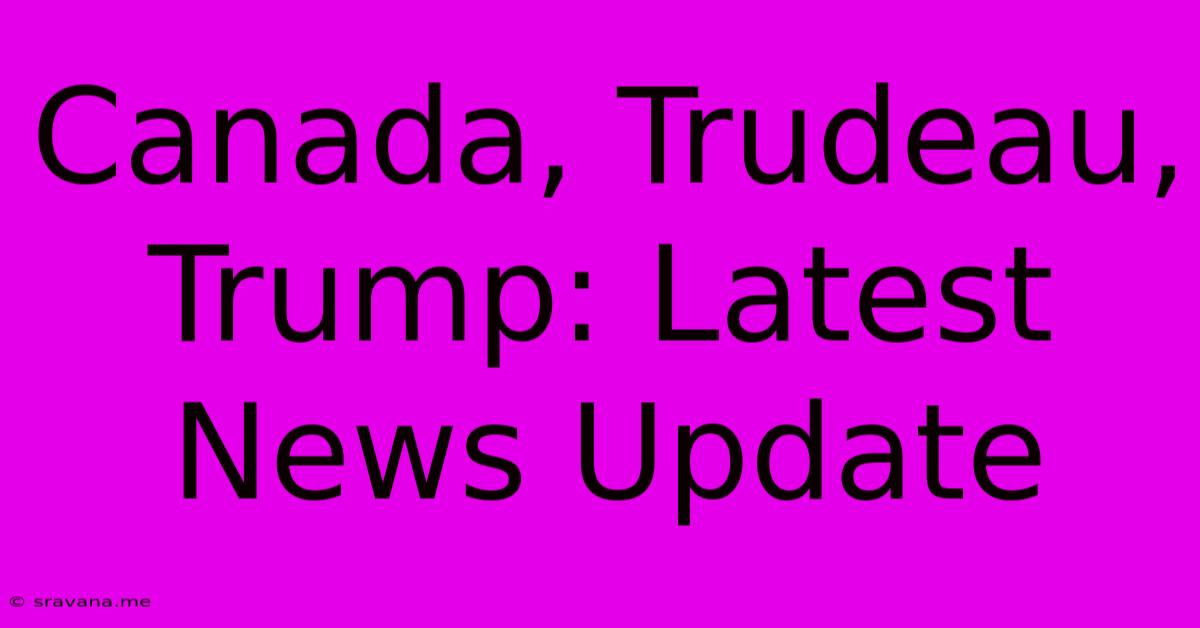Canada, Trudeau, Trump: Latest News Update

Discover more detailed and exciting information on our website. Click the link below to start your adventure: Visit Best Website sravana.me. Don't miss out!
Table of Contents
Canada, Trudeau, and Trump: Latest News Update – A Complex Trilateral Relationship
The relationship between Canada, the United States, and their respective leaders, Justin Trudeau and Donald Trump (despite the latter no longer being in office), continues to be a focal point of international news. While Trump's presidency is over, its impact on the Canada-US relationship reverberates, shaping the current political landscape and influencing the ongoing dialogue between the two nations. This article will delve into the latest news and developments, exploring the complexities of this trilateral dynamic.
Trudeau's Navigation of Shifting US Politics
Canadian Prime Minister Justin Trudeau has faced the challenge of navigating a rapidly shifting political landscape in the United States. The Trump era, characterized by unpredictable trade policies and nationalist rhetoric, presented significant hurdles for Canada's close economic and diplomatic ties with its southern neighbor. Trudeau's approach has been one of cautious diplomacy, balancing the need for strong bilateral relations with the defense of Canadian interests.
USMCA and Trade Tensions:
The renegotiation of NAFTA into the United States-Mexico-Canada Agreement (USMCA) stands as a key example of Trudeau's diplomatic maneuvering. While Trump initially threatened to withdraw from NAFTA entirely, Trudeau, alongside Mexican President Andrés Manuel López Obrador, successfully negotiated a revised agreement that preserved key aspects of the original accord while addressing some of the US administration's concerns. This accomplishment, however, came at a cost, with some concessions made on Canadian dairy and other sectors. The long-term effects of the USMCA and the ongoing trade relationship between the US and Canada remain a subject of ongoing analysis.
Environmental Policies and Diverging Approaches:
The differing approaches of Canada and the US on environmental issues have also created points of tension. While Canada has committed to ambitious climate targets and invested in renewable energy, the Trump administration's withdrawal from the Paris Agreement and its rollback of environmental regulations created a significant divergence in policy. The Biden administration's return to the Paris Agreement has eased some concerns, but significant challenges remain in aligning environmental policies across the border.
The Lingering Shadow of Trump's Presidency
Even after leaving office, Donald Trump's influence on the Canada-US relationship remains palpable. His populist rhetoric and protectionist policies left a lasting impression on the political discourse, creating a climate of uncertainty and mistrust that continues to shape the bilateral relationship.
Trump's Legacy on Trade:
Trump's frequent attacks on the North American Free Trade Agreement (NAFTA) and his threats to impose tariffs on Canadian goods created deep anxieties within the Canadian economy. While the USMCA replaced NAFTA, the experience left a lasting scar on the Canadian psyche, highlighting the fragility of the trade relationship and the potential for future disruptions. This experience has led to a renewed focus on diversifying Canada's trade relationships and reducing its reliance on the US market.
Political Polarization and its Transborder Effects:
Trump's presidency also exacerbated political polarization within the United States, a trend that has had noticeable effects on the Canada-US relationship. The increased political division in the US has made it more challenging for Canada to navigate the complexities of American politics and predict the trajectory of US policy. Understanding the shifts in the American political landscape and adapting to them remains a significant foreign policy challenge for Canada.
Current Developments and Future Outlook
The current state of the Canada-US relationship is complex and multifaceted. While the Biden administration has signaled a return to more traditional diplomacy and multilateralism, significant challenges remain.
Rebuilding Trust and Cooperation:
The Biden administration has prioritized repairing relationships with key allies, including Canada. However, rebuilding trust after the Trump era requires sustained effort and a commitment to addressing lingering concerns. Issues such as energy security, climate change, and trade continue to require careful management and collaboration.
Defense and Security Cooperation:
Despite political differences, Canada and the US maintain a strong defense and security partnership. The two countries cooperate extensively on matters of homeland security, counterterrorism, and continental defense. This cooperation is expected to continue despite shifts in the political climate.
Economic Interdependence:
The deep economic ties between Canada and the US remain a cornerstone of the bilateral relationship. The two economies are highly integrated, with significant trade flows and investment across the border. Maintaining this economic integration is crucial for the prosperity of both countries.
Conclusion: A Relationship in Flux
The relationship between Canada, the United States, and their leaders remains a dynamic and evolving one. The Trump era left a significant mark on the bilateral relationship, creating challenges that continue to require careful management. While the Biden administration's approach offers a more predictable and collaborative atmosphere, the inherent complexities of this trilateral relationship will continue to present obstacles. Maintaining open communication, fostering mutual respect, and finding common ground on key issues will be crucial for navigating the complexities of this important relationship and ensuring the future prosperity and security of both nations. Continued monitoring of policy developments and evolving political dynamics in both countries is essential for understanding the ongoing evolution of this crucial relationship.

Thank you for visiting our website wich cover about Canada, Trudeau, Trump: Latest News Update. We hope the information provided has been useful to you. Feel free to contact us if you have any questions or need further assistance. See you next time and dont miss to bookmark.
Also read the following articles
| Article Title | Date |
|---|---|
| Premier League Prediction Wolves Vs Forest | Jan 08, 2025 |
| Rams 5 Keys To Victory Against Vikings | Jan 08, 2025 |
| Wolves Vs Forest Watch Guide | Jan 08, 2025 |
| Match Gallery Wolves Vs Nottingham Forest | Jan 08, 2025 |
| Nfl Vikings Vs Rams Betting Preview | Jan 08, 2025 |
